English Dispatch
By melanie kuxdorf on January 25, 2023
The English Dispatch of The Centre for Sustainable Food Systems at UBC Farm
Alex Pomeroy first came to the UBC Farm as a practicum student in 2019, joining the field team in January 2020 as a field coordinator managing alliums, potatoes, cucurbits and legumes and spent one year with the chickens. He just left the Farm and Canada for London, where his partner is pursuing her Master’s in Music Psychology. In these dispatches, Alex is sharing his impressions on the agricultural landscape in the UK, as he moves from field work to pursuing policy and community work in food.
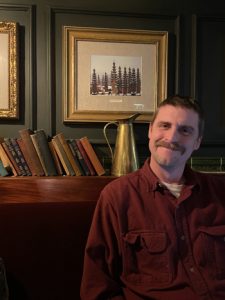
Alex Pomeroy at an English pub.
Two Days in Oxford
January 2023
As it happens, the novelties have not entirely worn off. I presently sit inside Oxford Town Hall for the opening of the Oxford Real Farming Conference. Oxford, England – home to the oldest English speaking university in the world. Yesterday my partner Shelby and I took a “coach” two hours up the “motorway” from London – granted about 45 minutes of that was simply getting out of the city. We had initially planned for a shorter, more scenic ride on the train, but the RMT (Union of Rail, Maritime and Transport Workers) were on strike, one of a number of short periods of industrial action since the middle of December. The response from current Tory PM Rishi Sunak has ranged from attempts to undermine the power of the strikes, permitting employers to bring in scab workers, and most recently, proposing anti-strike legislation which would allow public agencies to sue unions and fire employees who refuse to work – a move deemed likely illegal by the general secretary of the RMT, Mick Lynch. Workers from multiple public services including postal workers, nurses and border control have been taking similar action, demanding fair compensation and improved working conditions. I stand in solidarity with public sector workers in the UK, as I begin to navigate the social and political contexts of my new home. I believe this period of unrest critically shines a light on the experiences of migrant farm-workers in Europe, facing exploitative “contract-in-origin” policies, tying them to a specific farm (not too dissimilar to Canada’s TFW program, allowing workers to change employers but requiring them to reapply for a work permit). Even worse, undocumented workers experience horrible working conditions and pay, all while living in constant fear of deportation.
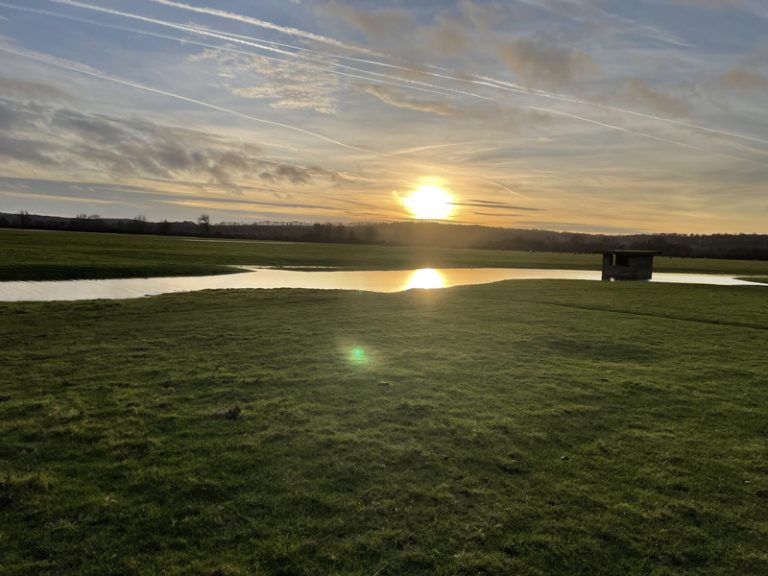
Wolvercote Common, Oxford. Grazing has been recorded here since at least 1086 – with many disputes regarding commoners’ rights over the centuries.
Anyways, back to the conference. I admittedly wake up in our hotel room with a bit of a headache, as we took in what the city had to offer last night, checking out some very old pubs and sampling local flavors. There was an incredible array of speakers (including Vandana Shiva) on topics ranging from gene editing (“GM’s with good PR” – Liz O’Neill / Director of GM Freeze), land struggles and agri-reform, the state of food policy in the UK, mass incarceration and prison abolition, and the plight of migrant workers in Europe. Speakers from a group called Cradle Community and the Landworkers Alliance spoke on those last two topics and I felt particularly fired up upon leaving the sessions. I was shocked to learn that there is a genetic technology bill currently going through Parliament, which if passed, would deem an organism not GM (including animals) if a gene edit made in a lab “could” have occurred in nature. Gene editing claims to be more targeted and precise, but as Liz O’Neill reminded us, it is crucial to recognize that precision does not equate to accuracy. One of the main takeaways from this panel including Dr. Shiva, was that contrary to the claims made by big agribusiness, we do have an abundance of food. The problem is with unequal access, and the fact that so much of what is produced is commodified for animal feed and biofuel (eg. soy and corn). One proposal put forth by The Land Magazine in their 2023 manifesto, to address the high costs and difficulties of obtaining organic certification, would put the burden of labeling on “farmers who employ chemicals or other ecologically suspect practices” rather than on small-scale organic growers. While this does not seem likely or feasible, it sure is a nice thought. I met some fascinating folks and the experience has begun to help me narrow down the type of work I want to find here in the UK, as well as fields of postgraduate studies I wish to pursue. Lastly, I want to thank Dakota Varen for recommending that I check out this conference!
Cheers,
Alex Pomeroy
Read More | No Comments
By juliana cao on January 16, 2023
Only one-in-five hungry Canadians use food banks — what’s broken?
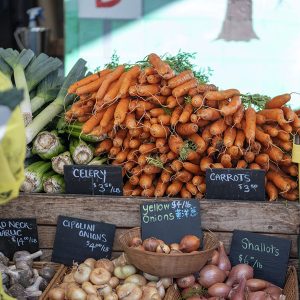
January 16, 2023
CSFS Associate and Land and Food Systems professor Dr. Jennifer Black explained why people avoid food banks.
“Most people will do almost anything to not have to go. They’ll borrow money from friends. They’ll sacrifice things. They’ll sell things. They’ll go into debt,” said Black.
Read More | No Comments
By juliana cao on January 16, 2023
Six new climate policies anticipated for B.C. in 2023
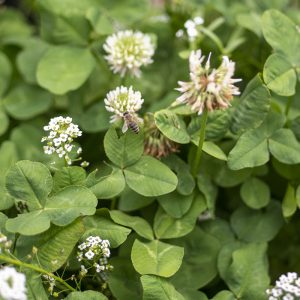
January 16, 2023
A report by CSFS Associate and Land and Food Systems research associate Matthew Mitchell looked into how Canada can reach its biodiversity targets by 2030.
Meeting the 30 per cent target of land and water conserved means the country will have to protect an area roughly equivalent to Alberta, Saskatchewan and Manitoba combined, according to Mitchell.
Read the full article at the Vancouver Sun.
Read More | No Comments
By juliana cao on January 16, 2023
Five ‘eco-types’ who focus on the environment
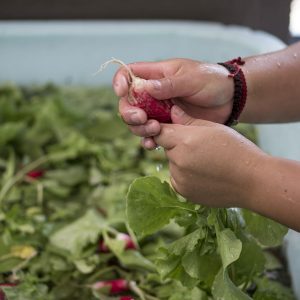
January 16, 2023
CSFS Associate and Sociology professor Dr. Emily Huddart Kennedy wrote about the most common types of relationship people have with the environment.
The eco-types include the Eco-Engaged, Self-Effacing, Optimists, Fatalists and the Indifferent.
Read More | No Comments
By juliana cao on December 7, 2022
What type of environmentalist are you?
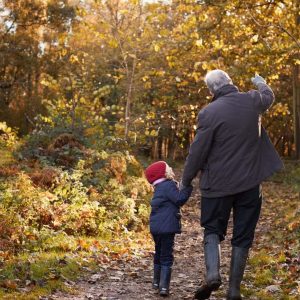
(Dreamstime)
December 7, 2022
CSFS Associate Dr. Emily Huddart Kennedy argued that instead of judging a person’s behaviours or attitudes about environmental issues, we can become curious about why they believe or act as they do.
“We can trust that if we had grown up in the same circumstances, we would likely think and do the same,” said Kennedy, “remember that everyone cares about the environment, even if we don’t like the way some people demonstrate it.”
Read the full article at the Toronto Star.
Read More | No Comments
By juliana cao on December 7, 2022
Raccoons get a reputation makeover
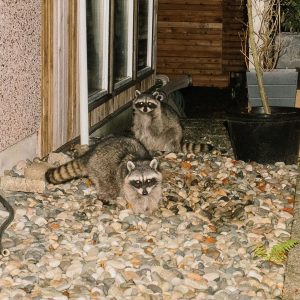
(Alana Paterson/The Wall Street Journal)
December 7, 2022
CSFS Associate Dr. Sarah Benson-Amram (Forest & Conservation Sciences, Zoology) discussed her research that is mapping raccoon social networks.
Read the full article at the Wall Street Journal (subscription).
Read More | No Comments
By juliana cao on December 5, 2022
Toronto, British Columbia and McGill Named Among Top 100 Best Universities In World
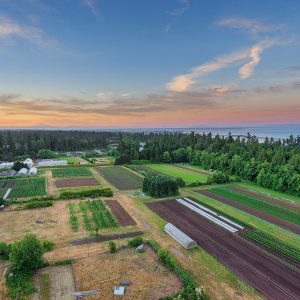
December 5, 2022
Ranked 35th in the global universities report, UBC snagged a score of 77.5 and the number two spot among Canadian universities.
The 58,590-student university in Vancouver was noted for its national TRIUMF subatomic physics laboratory, the Centre for Sustainable Food Systems at UBC Farm and the Institute for Healthy Living and Chronic Disease Prevention.
Read More | No Comments
By juliana cao on December 5, 2022
Fewer chemicals is good news for Earth’s ozone. Here’s why
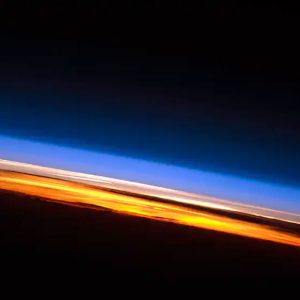
(NASA)
December 5, 2022
CSFS Associate Dr. Tara Ivanochko (Department of Earth, Ocean and Atmospheric Sciences) explained why we need to protect the Earth’s ozone.
“For a period of time, we were using chemicals for things like refrigerants [a chemical used to make things cool] that would get released into the atmosphere and break down the ozone,” said Dr. Ivanochko.
Read the full article at CBC Kids.
Read More | No Comments
By juliana cao on December 5, 2022
How this UBC-led team developed a first-of-its-kind farming app
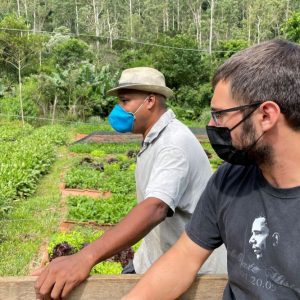
(Hannah Wittman/LiteFarm)
December 5, 2022
Developed by a farmer-scientist partnership at UBC, LiteFarm is a free and open source management tool that enables farmers to manage their operations more sustainably.
Team members Dr. Hannah Wittman (CSFS Associate), Kevin Cussen (LiteFarm Product Manager) and Dana James (post-doc at the CSFS) discussed how the app is supporting the transition to climate-resilient agriculture.
“We’ve grown from a handful of farms in BC to more than 2,300 farms in more than 120 countries. We’ve been inspired by the ingenuity with which our users employ LiteFarm to run their farms,” said Cussen.
Read the full article at Daily Hive.
Read More | No Comments
By juliana cao on December 2, 2022
Saskatchewan farmers, researchers worry investor-bought land ’empties out the countryside’
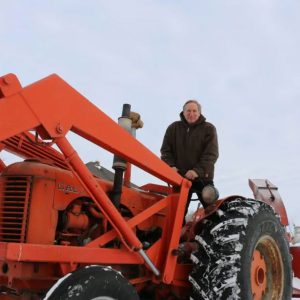
Farmer Terry Boehm is concerned about the future of his community and other farming towns as the price of land creeps up. (Sam Samson/CBC)
December 2, 2022
Kat Aske, Practicum Field Coordinator at the UBC Farm, commented on how the market value of farmland in Alberta is completely disconnected from how much farmers can make on the land.
“This is a massive problem,” Aske said. “As farmland prices rise, this becomes more of a pervasive problem because fewer and fewer actors or people are able to purchase land at all.”
Aske was recently part of a research team based at the University of Manitoba looking into how farmland tenure is changing on the Prairies.
Read More | No Comments










